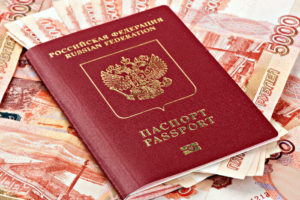While many countries are pausing any passport, residency, and citizenship activity right now, Russia is loosening its requirements to become a Russian citizen.
May 4, 2020
By: Bobby Casey, Managing Director GWP
Which is why I’m a bit surprised at the Kremlin’s recent announcement regarding Russian citizenship acquisition. Normally Russia makes the news for being heavy-handed or under-handed. But this time, they are being uncharacteristically open-armed!
Russian officials were discussing immigration reform, but no matter where you live: politicians talking about something, and actually doing it, are worlds apart.
Back in February, when these talks started making news headlines, some really liberal (in the classical sense) changes were announced:
-
Ability to get a Russian passport without renouncing home country citizenship
-
Lifting of the language requirement for Ukrainians and Belarusians
-
Lifting requirement for proof of legitimate source of income
-
Lifting requirement for five years continuous residency in Russia before applying
These relaxed terms for citizenship, residency, and passports are targeted toward what is being called “fraternal countries”: former Soviet nations, similar in culture and language.
Russia has seen a shrink in population over the last couple years, and what has offset that is immigrants. The very simple solution to a shrinking population is to invite more people in. The hope is to attract about ten million new citizens to Russia.
Part of what the legislative houses passed was this:
Citizens of Moldova, Ukraine, Belarus, and Kazakhstan have had their process to Russian citizenship made even more relaxed, with the entire residence requirement being altogether removed.
This will likely not go into effect until mid-May, as most immigration services are shut down until then. But the fact that such legislation was passed during this time, instead of being delayed or deferred is incredible.
These loosened migration regulation are not without provisions especially for long term residency:
Foreign nationals wishing to receive a permit for a long-term stay in Russia will be required to have an account in the state information system, obtain a special document with a digital data bank, provide the state with their biometric data, and prove they aren’t carrying any dangerous contagious infections.
They are looking to streamline the process, especially for Russian based businesses that are looking for laborers.
This is also some good news for Edward Snowden who is looking to extend his asylum residency. I’m unsure how this would affect American nationals versus someone from Belarus. Hopefully, the process for getting his extension or even possible citizenship is less painful.
There are three possible ways in which residency or citizenship in Russia is possible.
First is through something similar to an H1-B in the US where a business sponsors the employee for residency.
Second is citizenship granted to those who are aligned with Russia or as it was put have “positive social ties to Russia” with a “similar mentality and culture”.
The third is a little vague. Those who are considered “vulnerable” or “particularly valuable” to the country. There isn’t much qualifying either of these criteria. These will probably be subject to some sort of government review on a case-by-case basis.
It’s very possible that the erstwhile NSA contractor turned whistle-blower, Edward Snowden, might fall into the “vulnerable” bucket. He is charged with espionage and theft of government property in exposing the scope of the NSA’s surveillance.
He’s agree to return to the US if he’s guaranteed a fair trial. Since no such guarantees have been offered, he’s since filed for an extension since 2013, and again in 2020 since his last extension was set to expire in April of this year.
I’m surprised to see any sort of activity in the citizenship and residency space right now, especially from Russia! But this is certainly stuff to keep on your radar. I’ll be watching closely how this unfolds.
The response to Covid-19 was eye-opening. I took a road trip around the United States, and it was alarming to see Texas and Arizona behaving similar to any other blue state like California or New York, while states like South Dakota and Wyoming simply weren’t having any of it.
In the US, Texas and Arizona have a reputation for being far less regulated than their blue state counterparts. So much so, they have received a lot of California escapees in recent years.
Even on the global front, the US touts itself as freedom-loving, yet it was Sweden and South Korea that remained open while the US mostly closed down.
The lesson here is to monitor how each jurisdiction handles a crisis. If you were thinking of relocating or expatriating, it’s worth evaluating how your top choices performed under pressure. I’m not saying move to Sweden or South Korea, but I am saying factor in the response from your destination country and see if it’s a deal-breaker.
Click here to schedule a consultation or here to become a member of our Insider program where you are eligible for free consultations, deep discounts on corporate and trust services, plus a wealth of information on internationalizing your business, wealth and life.


